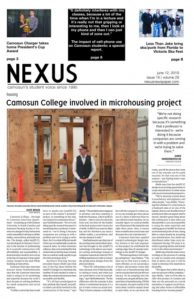The BC government has identified post-secondary as a vulnerable sector for money laundering and are asking institutions such as Camosun College to put measures in place to prevent money laundering. It’s about time.
Around $7.4 billion in cash was laundered in British Columbia in 2018, according to a report by a panel of experts led by former BC deputy attorney general Maureen Maloney.
From the luxury-car market to real estate, dirty money is being converted into clean money across our province. Many of the province’s issues—skyrocketing housing prices, underground drug markets, gang-related crimes—are linked to this activity.
On May 28, the BC government announced it would send letters to 367 public and private post-secondary institutions across the province to inquire about their practices on accepting cash as a method of tuition-fee payment. This step by the government might lead to the imposition of a future ban on cash payments in colleges. Post-secondary institutions have been given a one-month deadline to respond.
This is certainly a step in the right direction considering how Canada is slowly becoming a safe haven for cleaning dirty cash. There’s a lot of money laundering happening in the province, and post-secondary institutions might just be the next target.
Post-secondary institutions are very vulnerable to being used as a medium for money laundering. Apparently, some students have been paying fees for several semesters in advance and then withdrawing to receive a fee refund as a cheque from the college (the reports detailing this do not name institutions where this has happened). There’s even a report of a student showing up at a college with $9,000 in cash in a bag, paying the $150 he owed, and depositing the rest. He was basically asking the college to serve as his bank. This is one of the many tactics used by money launderers to render dirty money clean. The cash could be coming from drugs, extortion, insider trading, or illegal gambling.
Criminals might use naive students to convert their ill-gotten cash to clean money, and the student—who doesn’t necessarily know what’s happening—might be the one who ends up getting in trouble.
It used to be that casinos were used for money laundering. The realization that this is now seeping into institutions of higher education is simply nerve-racking.
Camosun College still accepts fee payments in cash, so the college needs to be very careful moving ahead.
What about the students who want to pay their tuition in cash? Well, first of all, who the heck carries this much money to college in a bag to pay for their fees? Even if they do bring it to the college safely, the question arises: how did they get that money?
The government’s decision on this is clearly a step in the right direction and would help solve many of BC’s problems related to financial crimes.
Let’s hope that the government brings the situation under control in post-secondary institutions—such as Camosun College—across the province.

